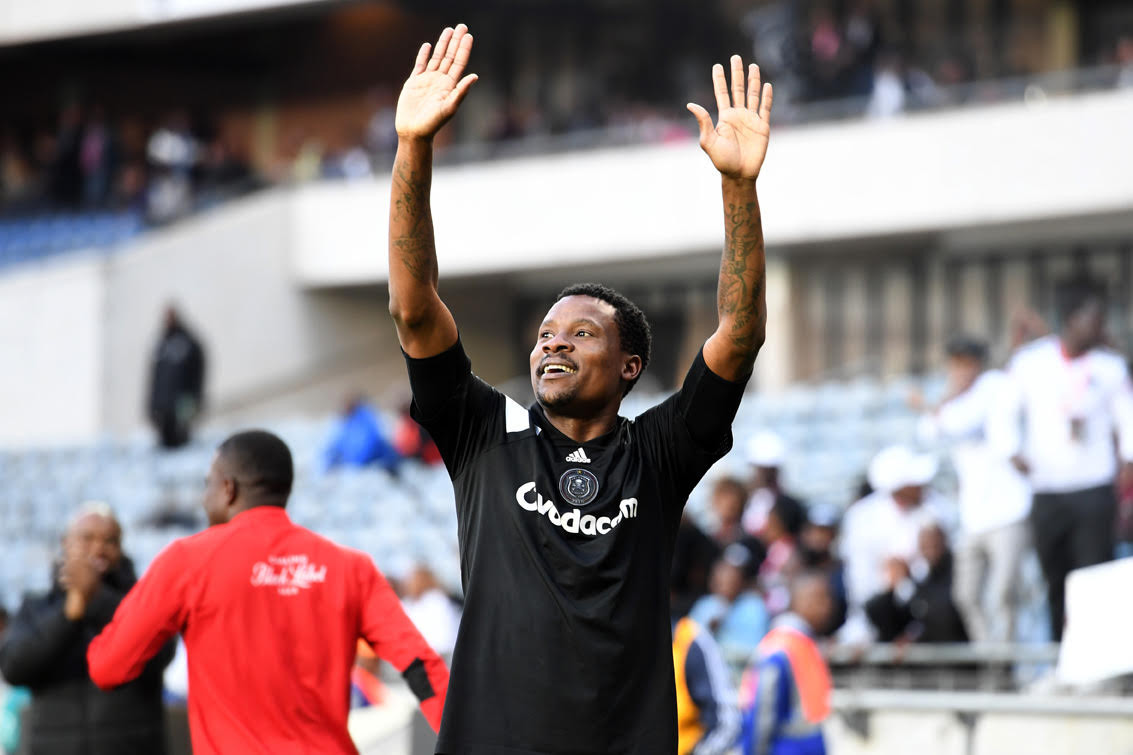Unfinished: Gabuza and the PSL goal drought
The problem of the PSL’s sustained paucity of goals is bigger and deeper than any given specialist coach can fix. Over the last 16 years, the league’s goals-per-game average has hovered around the …
Author:
31 August 2018

Thamsanqa Gabuza’s meltdown on Tuesday night was pretty crazy, but it didn’t come from nowhere. He was channelling the collective frustration of his generation of South African strikers.
When he hurled his Orlando Pirates’ shirt at his tormentors in the ranks of the Ghost before storming down the tunnel at Peter Mokaba Stadium, Gabuza spoke for a troubled fraternity of post-millennial South African forwards.
As a rule, contemporary strikers in the country don’t score often enough. As a rule, the fans have little patience with their limitations. Cue a vicious cycle: frustration heightens pressure, pressure heightens errors, errors heighten frustration.
To be fair, Gabuza is an unusually inaccurate finisher. He is one of those big, galloping strikers, found in most middling leagues, who are selected largely for their pace and power and not for their dubious precision in the box.
For a team of Bucs’ storied prestige and urgent ambition, Gabuza should be a squad player at best. But Pirates coach Milutin Sredojević has few proven contenders to replace him with up front – and too few proven goal scorers across his team sheet.
Before this season began, “Micho” hired the French specialist finishing coach, Stephane Adam, from Lille in an effort to improve his beloved club’s “GF” column. It’s safe to say it hasn’t helped: after the first four league games of the season, the Sea Robbers have netted just twice – one through a penalty and the other with some help from the opposition in the form of an own goal.
But the problem of the PSL’s sustained paucity of goals is, of course, bigger and deeper than any given specialist coach can fix. Over the last 16 years, the league’s goals-per-game average has hovered around the 2.3 mark. That’s on the bottom end of the global spectrum – despite the brisk tempo of our game and the financial ability of PSL clubs to shop around for the best forwards across southern Africa.
We see some fantastic goals every week in the PSL: for example, at the Peter Mokaba Stadium on Tuesday, Joseph Mhlongo netted with a humdinger of a left-footed volley for Black Leopards against none other than Pirates. But we don’t see enough routine goals to fill out the stats sheet: six-yard headers, tap-ins and rehearsed setpieces.
Tradesmen
It wasn’t always this bad. Back in the 90s, South Africa was home to a generation of natural goalscorers: Mark Williams, Daniel “Mambush” Mudau, Benni McCarthy, Pollen Ndlanya, Philemon “Chippa” Masinga, Grant Young and Shaun Bartlett.
As Masinga points out, most of that generation were not complete footballers. They were not artists; they were tradesmen. For example, Percy Tau is twice the football technician that Mudau was, but he scores half as many goals.
Forwards like Mudau and Masinga regularly missed chances, as even the greatest goalscorers do, but because their scoring ratio remained consistently healthy, they weren’t dispirited by the misses. They stayed in the right areas, exhausted their markers, chased every loose ball and expected every quarter chance to yield a goal. In the moment of shooting, their sole project was to put a shot on target, not to score the goal of the season.

So what’s changed? Some development coaches believe that South Africa’s goalscoring deficiencies have their roots in the freewheeling informality of kasi neighbourhood games, which remain the formative technical environment of many kids who later become pros.
When your goalposts are a pair of bricks placed a metre apart, you don’t internalise the dimensions of a regulation goalmouth. In many street football games, there are no goalposts at all – the object is simply to retain possession, in style.
But that culture has been around for decades, so it can’t entirely be blamed for the post-millennial goalmouth malaise.
In defence of Gabuza and company, Masinga says we have to consider the quality and frequency of the chances they get. “How many chances does [Romelu] Lukaku get in a game for Manchester United? How many does [Mohamed] Salah get?” he quizzed New Frame this week.
Mental strength
“Often, our PSL teams play defensively and rely on counterattacks,” says Masinga. “That means fewer touches for strikers. And if you don’t get enough touches, it hurts your confidence.”
Masinga was himself the target of the boo boys in his Bafana heyday – despite being a prolific, skilful and awkward attacker who was hell to mark. So he knows what Gabuza has been going through recently.
“I am not going to condone the supporters for booing Gabuza. It’s totally disturbing. It takes a player out of a game. You start to fear moving into the right positions, or taking the right risks. You think: ‘If I miss here, what will the fans do?’
“But I’m also not condoning Gabuza’s action in inciting fans. It looks like an insult and could lead to violence. The only way of shutting them up is to put the ball in the net.” “A striker should be strong mentally. You should accept criticism.
You’re going to miss chances, but you can’t think about a miss after it’s happened. You think about the next chance.”
Gabuza’s red card, for taking off his jersey in his wild celebration and leaving the pitch without permission, gives him plenty of time to think about his next chance. The big risk, of course, is thinking too much.
